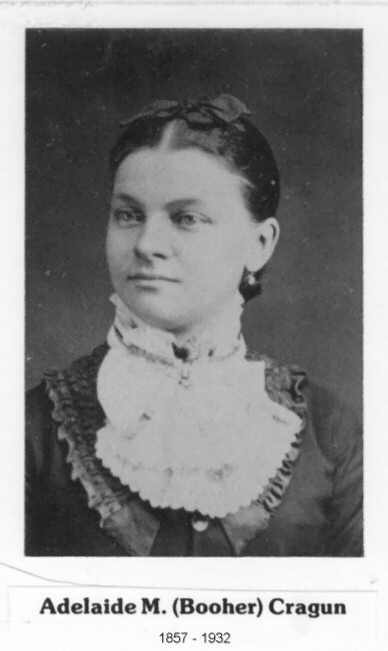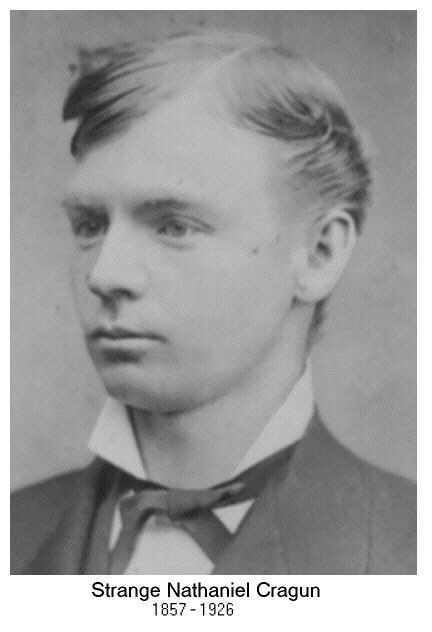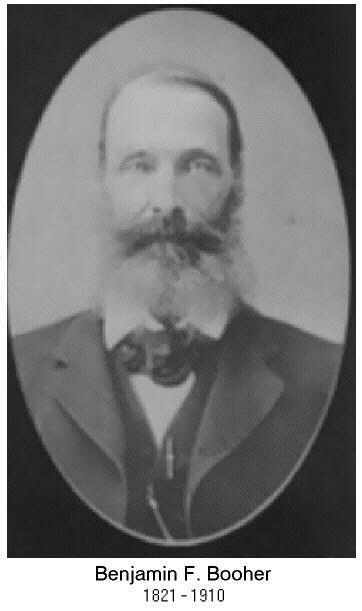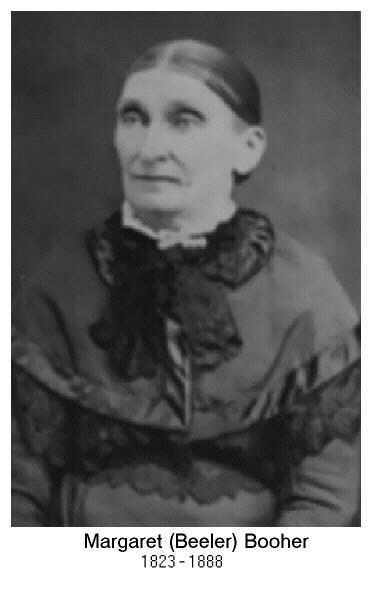
Individual:
Benjamin Booher
Birth: 9/1/1821 Sullivan Co., TN
Death: 12/28/1910
Spouse: Margaret Beeler
Birth: 1/11/1823 East TN
Death:
Marriage: 10/20/1842
Children:
Martha
Margaret E.
William J.
Albert L. (lived only 4 months)
Benjamin C. see Note
1
+ Martha L. White m. 11/4/1870
+ Clara M. Dooley m. 11/21/1886
Sylvester C. moved to Kansas City
Vando L.
+ Elma O. Schooler couple lived in Perry Township, Boone Co,
IN
Ada photo
+ Strange Nathaniel Crajun
see Note 2
photo
lived in Lebanon, IN
Mark A.
+ Elma F. Hoggins couple lived in Worth Township, Boone Co., IN
Emma R.
Daniel W. V.
+ L. Elsie Barb coupled lived 1 mile east of Whitestown, IN
Minnie M.
+ Leander W. Tomlinson couple resided 1 mile south of Whitestown,
IN
Spouse 2: Mary Ross Smith
Birth:
Death:
Marriage:
Early Life and Times of Boone County,
Indiana, published May 1877, republished 1974
Benjamin Booher received his education when
there were not such facilities as we now have. The school
building that he attended was an open log cabin without any floor but the earth.
The benches were made of
round logs split once, with diverging pins in the ends for supports. The chimney
occupied one entire end of
the house. The writing desk was a wide board laid on sloping pins in a log on
one side of the cabin. The pens
used in writing were made from the large feathers of geese and buzzards. The
teacher and the methods
of teaching were as novel as the house. Such is a brief decription of the school
that Mr. Booher attended.
Although his edrcation was limited, yet he so improved it that with the good
native talents with which he is
blessed he is fully qualified for the transactions of the ordinary business of
life. He is a good reader, and
keeps himself well informed on the various subjects pertaining to the interest
of the common citizen. He is a
pioneer, and one of the leading citizens of Boone County.
On the 20th day of October, 1842, Mr. Booher
was united in marriage to Miss Margaret Beeler, whose
parents came from East Tennessee to Indiana only a few weeks before Mr. Booher
arrived.
Mrs. Booher was born in East Tennessee, January 11, 1823. Her grandparents on
her father's side came
from Switzerland; on her mother's side from Ireland. Mrs. Booher's advantages
for an education were similar
to those Mr. Booher, for they attended the same school. The result of their
marriage is twelve children.
Mr. Booher is one of the early pioneers of this country. He endured the
hardships and privations common to
the early settlers of a country. When he and Mrs. Booher started out to battle
with the realities of life they
had but little of the necessaries to make life comfortable. Their culinary
department was not filled with such
things as we find in a pantry of today. They had one oven, one iron pot, three
pewter plates, three knives and
forks, two cups and saucers and a few other things common among the pioneers of
this country.
In the year 1845, Mr. Booher moved to where he
now resides: one-half mile south of Whitestown, Boonne
County, Ind. This country was then, to a great extent, a wilderness and much of
it under water. Mr. Booher
killed wild ducks in a pond where Whitestown now stands. He purchased ninety
acres of land which, at the
time, was covered with a dense forest hitherto unmolested by the woodman's ax.
He could see nothing
before him but a life of toil, but with that determination that characterizes
the successful man, he entered
upon the arduous task of felling timber, clearing land, rolling logs and
cultivating the soil, laboring from early
morn until dewy eve under the disadvantages incident to all the early settlers.
Mr. Booher, by industry, perseverance, economy
and good management, accumulated a considerable
amount of wealth He owns several farms, aggregating several hundred acres of
productive land. He ranks
with the leading financial men of the county. For his success in this particular
he deserves much credit. He
was not a lazy loiterer, who expected a streak of good luck to come to him. He
knew that honest endeavor
weaves the web of life, turns the wheel of fortune, amasses wealth and keeps one
permanently rich, Mr.
Booher's indomitable will and inflexible purpose, linked with courage to work
for an honest living, led to his
financial success. Men who do not go out into the great field of human exertion,
but wait for success to
come to them, are the men who, for the most part, are at the bottom of
dishonesty and corruption. Lazy men
hate the rich and always have hated them. They never emulate their energy,
industry and economy and hence
deserve no help from them, Laziness has cravings for vices which lead to untold
misery.
Mr. Booher did, until late years, vote with
the Democratic party. His first vote for president was cast for
James K. Polk. He is now in sympathy with the Nationtal party. He became
somewhat disgusted at the
management and the political machinery of the two leading parties, and like
Shadrach, Meshach and
Abednego, he refuses to bow to the images they set up, or to dance to their
music. He protests against the
despotism of American polities, and claims that at conventions, at the
ballot-box and everywhere, without
hindrance and without malediction, men shall vote as they think best, keeping in
view the common interest
of the people of the nation. He does his own reading and thinking, and votes and
acts accordingly.
As a financier Mr. Booher has but few equals, as is evidenced by his financial
success and history. He never
made a mistake in his judgment as to his own financial affairs. His judgment in
regard to the finances of our
great nation has not as yet been fully tested. He has a right to his opinion and
to the advocacy of it both by
speech and ballot. In another part of this work will be found a portrait of Mr.
Booher.
Source: History of Boone County, Indiana, by Hon. L.M. Crist, 1914.
Benjamin Booher, for years one of the
wealthiest residents of Boone county, and one of the most energetic and
business-like farmers of his township, intelligent and self-made, descended from
good old Pennsylvania German stock, and was well worthy of a prominent place in
any volume of biographical record. His grandfather, John Booher, on coming from
Germany to America, first located in the Keystone state
and there married a native of Germany, and to this union were born the following
named children: Jacob, Mary, William, Benjamin, John, Frederick, Isaac, Henry
and Elizabeth. All of them, imbued with the stamina of their origin, grew to
maturity, emigrated to the farming lands of Virginia and Tennessee and reared
families to add to the wealth of the nation through their incessant toil. John
Booher, the grandfather, finally found a home in Sullivan ounty,
Tennessee, in the early settlement of that section, but still retained his
farm in Washington county, Virginia. He was a slave owner and a well-to-do
planter of considerable influence in both states. His son, Jacob, the father of
Benjamin, our subject, was born in Pennsylvania on March 3, 1777, and when a boy
of twelve, in 1789, found himself a resident of Tennessee. He there learned the
blacksmith's trade, and there married Catherine Barnett, a daughter of Nicholas
and Barbara Barnett, and to this, his first marriage, were born five children,
named William, Mary, Elizabeth, Guardianas and
John M. This lady was called away in due course of time and Mr. Booher married
her sister, Elizabeth Barnett, and to this union were born seven children, viz:
Catherine, Jonathan, Jacob, Ambrose, Lucinda, Benjamin and Leander. December 8,
1834, Jacob Booher left Tennessee and came to Indiana and settled on one hundred
and sixty acres of entered land in Montgomery county, to which he subsequently
added by purchase two hundred and forty acres, but not immediately adjoining his
entered property. He became a
man of much wealth and influence and a representative citizen. He and his wife
were faithful members of the Lutheran church, and in politics he was a
Jacksonian Democrat. He lived to be sixty-eight years of age, and died July 29,
1845, on his farm in Montgomery County, Indiana, mourned by all who knew him.
Benjamin Booher, late of Lebanon, Indiana.
with whom this particular sketch has most to do, was born on his father's farm
in Sullivan county, Tennessee, September 5, 1821. He received the education
usually accorded in the common schools of his early days, but was an apt scholar
and quick to learn through self-application to the books that came within his
command. He was thirteen years of age when he came to Indiana with his parents,
and here he was invigorated both in body and mind through the severe discipline
of farm labor. He was married in Boone county on October 20, 1842, to Margaret,
daughter of William and Margaret (Hughes) Beeler, and twelve children were born
to this genial union. The order of birth is: Martha, Margaret E., William J.,
Albert L., Benjamin C., Sylvester C., Vando L., Adelaide M., Mark A., Emma R.,
Daniel B. and Minnie F.Benjamin Booher had been but three years married when he
located in what is now Whitestown, Boone county, where he bought ninety acres in
the dense wilderness. He cleared it of its heavy timber, and by hard work and
thrift increased his possessions to one thousand seven hundred acres, almost all
of which was in one body, and of this large property he gave to his children,
donating to each of them a comfortable sized farm. After the death of his first
wife, Mr. Booher married Mrs. Mary Smith, who had borne the maiden name of Ross.
He then moved to Lebanon, and here purchased his substantial and elegant brick
residence, retiring from the more active duties of business, but still following
his restless activity in giving his attention to the details of some of the more
important business of his life until a short time prior to his death, which
occurred on December 28, 1910.
Mr. Booher was a man of remarkable physical
strength as well as intellectual superiority and force of character, and it is
stated that at the age of fifty-five years he could easily spring over the back
of a high horse. His stupendous labor in the field and untiring industry have
given full evidence of his physical endurance. He was entirely self-made as to
pecuniary affairs, but his position as an intelligent citizen of high standing
before his fellow-men has come through nature alone. He took but little interest
in politics, thinking
for himself on all matters pertaining to political economy and party affairs,
but yet, on one occasion withdrew from his personal business to become trustee
of Worth township as a self-imposed duty. He won his high position before his
fellow-citizens entirely through his personal exertions.
Mr. Booher's mother, Elizabeth Barnett, was
born on February 3, 1779, a daughter of Nicholas and Barbara Barnett; they were
natives of Pennsylvania and later they moved to West Virginia, where they
remained until death. They were farmers and very devoted Christian people and
were the parents of the following named children: George, Catherine, John, Adam,
Jacob, Peter, Elizabeth, Mary, Margaret, Sarah and Nicholas. The
father of this family was a man of ordinary means but much respected.
Source: Amy K Davis
Note 1
Lived in Zionsville, Ind. He was elected
County
Commissioner in November, 1884
Note 2


Strange Nathanial Cragun
His Story
As was the custom of the time, most of Hiram's children became farmers
establishing their own farm families. However, his seventh child and fourth
son, Strange Nathaniel had another calling. His obituary published in the May
27,1926, edition of the Lebanon Reporter was printed as the front page lead
article. It revealed the following information about this prominent citizen of
Lebanon and Boone County.
He was born on the farm in Eagle Township July 24, 1857. He received his
preparatory education in the common schools. This was supplemented by a course
of three years at the Zionsville Academy and one term at Purdue University.
Following this, he became a teacher in Boone County at age seventeen. He began
teaching in 1874 at the district schools of Worth Township and then the graded
school at Zionsville for a total of four years. He then had charge of the
graded school of Reelsville, Putnam County, for one year.
In the spring of 1879, while on a visit to Purdue, he went before the Board of
Examiners of candidates for admission to the U.S. Military Academy at West
Point, New York and was selected from the thirty-one applicants from the 9th
Congressional District. He commenced studies at the academy in June, 1879,
having been admitted to the class of 1883. Two years later, because of
impaired vision, he was obliged to tender his resignation.
Returning to Boone County in 1881, he was appointed to the principalship of
the Whitestown graded schools for one year. He then entered a joint
principalship of the Zionsville school for one year. He then came to Lebanon
in 1883, and for four years was principal of the high school. In 1887 he was
elected county superintendent of schools, a position he held for four years.
He achieved the reputation of being an excellent disciplinarian both as a
teacher and as a superintendent being "strict, but impartial in his
examination of teachers and reduced the number of licenses nearly one half"
during his tenure.
On May 2,1891, he bought the Lebanon Patriot, the oldest newspaper in Boone
County. It was Republican in politics and published weekly in competition with
the Lebanon Pioneer, a weekly Democrat newspaper published by Ben McKee with
whom he waged friendly editorial war. He sold the Patriot in 1913 after twenty
two years but continued to do some news and editorial work on journals
throughout the state.
In 1916 he was commissioned a member of the State Tax Board by Governor Samuel
Ralston for a period of four years. During this time he rewrote the ammended
tax law for Indiana, a product which was later declared a model plan for
taxation.
In addition to his work as educator, publisher, and tax. authority, he: served
two terms as treasurer of the Lebanon School Board, was director for 25 years
of the First National Bank, organized the Citizens Loan and Trust Company in
1899 which he served as director until his death, was a 40 year member of
Lodge #45 Knights of Pythias, was a York and Scottish Rite Mason, was Past
Commander, Commandery #43 Knights Templar, was a member of: Lodge #9 F&AM,
Modern Woodmen of America, and Centenary Methodist Episcopal Church which he
served as trustee in addition to being active in the church and Sunday
Schools.
While not a subscriber to some of the dogmatic theologies of the church, he
was a firm believer in God and of the teachings of Jesus Christ. He frequently
quoted as an expression of his religious belief: Micah 6:8 and the words of
Johan A. Hadaller who held that: Christ's Sermon on the Mount (Matt 5-7) when
followed; His beautiful parable of the Good Samaritan (Lk 10: 30-37) when
practiced; and the two great commandments which he enunciated (Matt 22: 36-40)
would not only make a man great among men but, on the authority of Christ,
would make such a person quite pleasing and acceptable to God Himself.
His honors included appointment to the military staff of Governor W.T. Durbin
in May 1901 as Aide-de-camp with rank of Major.
On June 17, 1883, at the time he became principal of Lebanon High School, he
was united in matrimony with Adelaide Maleva Booher, daughter of Benjamin F.
and Margaret (Beeler) Booher, at Whitestown. To this felicitous union three
children were born:
Twins born May 28, 1885 - Opal, who died October 31,1891 at age 6 1/2, and
Ethel, who died April 16, 1897 at age 11 l/2, both victims of the effects of
scarlet fever.
Dwight Booher, born October 5,1891- Died Dec.8,1971, at age 80.
Two years after Dwight's birth, they built a substantial home at 404 West Main
Street in Lebanon. This home was situated on property where they had been
living since their marriage. The older home at the back of the lot was later
removed. Being one of the finer houses of the city, it was among those
featured in the Anniversary Edition of the Lebanon Pioneer dated March 28,
1895, on page 18. The residence in 1988 became the home of the Boone County
Historical Society by gift from their grandchildren.
In their later years they traveled extensively attending the 1900 Paris
Exposition while touring Europe. They lived for five months in Hawaii from
November 1920 through March 1921 traveling through the U.S. West on their
return during April 1921. They also wintered in Daytona Beach and Ft. Myers
Florida and summered in Bay View, Michigan where they were members of the Bay
View Society.
S. N. died May, 1926, and is buried in the family lot at Oak Hill Cemetery
Lebanon. Adelaide survived him by six years passing away on December 22, 1932,
at the home of her sister, Miss Emma Booher, on West Washington Street, where
she had been stricken three weeks before with paralysis while visiting and was
unable to be moved to her own home. She was seventy five years old when she
died
|




